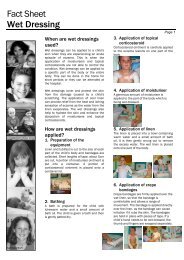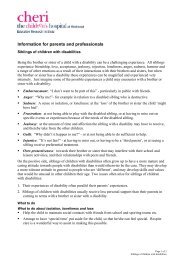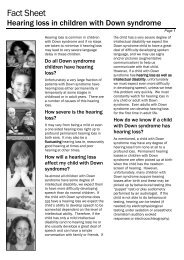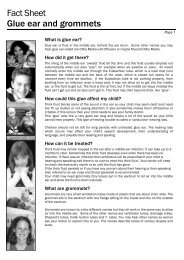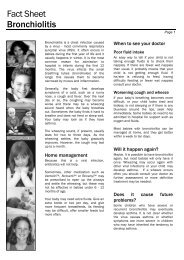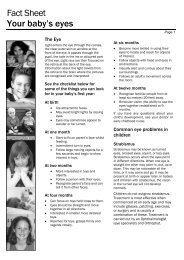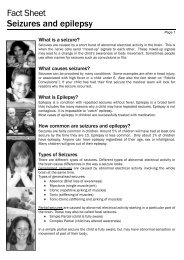Fact Sheet - Kids Health @ CHW
Fact Sheet - Kids Health @ CHW
Fact Sheet - Kids Health @ CHW
You also want an ePaper? Increase the reach of your titles
YUMPU automatically turns print PDFs into web optimized ePapers that Google loves.
<strong>Fact</strong> <strong>Sheet</strong><br />
Microtia<br />
xcvxcvxcv<br />
What is microtia?<br />
This is a medical name for a poorly<br />
developed ear. The ear may be very<br />
small, folded over or deformed.<br />
Sometimes the ear canal is very narrow<br />
or missing altogether. It can occur in one<br />
or both ears.<br />
How will it affect my child?<br />
Microtia affects your baby’s appearance<br />
and you may feel shocked or<br />
disappointed that your baby does not<br />
look perfect. This is a normal feeling.<br />
When children are older they may<br />
sometimes become self-conscious about<br />
the appearance of their ears. They may<br />
ask for the ear to be fixed.<br />
In most cases there is poorer hearing in<br />
the ear with microtia. If your child has no<br />
ear canal there is at least a moderate<br />
degree of deafness in that ear i.e. at<br />
least a 60 decibel hearing loss. If both<br />
ears are affected your child will usually<br />
require a hearing aid.<br />
What causes microtia?<br />
In most children who have microtia we<br />
cannot find any cause. It is not due to<br />
carelessness or neglect by the mother<br />
during pregnancy.<br />
Will my child have other<br />
problems?<br />
In many cases the ear is the only part of<br />
your child that has not developed<br />
perfectly. In a few cases, the microtia<br />
may be part of a syndrome such as<br />
Goldenhaar’s Syndrome in which other<br />
abnormalities are present. It is<br />
important for your child with microtia to<br />
be examined carefully after birth so that<br />
any problems in other areas can be<br />
picked up quickly.<br />
Is microtia hereditary?<br />
Page 1<br />
In most cases this is not so. In a few<br />
genetic syndromes microtia may be<br />
inherited. Discussion with a genetic<br />
specialist is recommended if there are<br />
concerns about inheritance.<br />
Ear Abnormalities in<br />
Microtia<br />
In almost all cases of microtia the ear<br />
lobe, the outer ear canal and the middle<br />
ear are all affected.<br />
The Ear Lobe:<br />
The deformity may vary from being very<br />
mild to very severe. Occasionally the ear<br />
does not develop at all.<br />
The Outer Ear Canal: This is frequently<br />
very narrow and may be non-existent.<br />
The Middle Ear:<br />
This is the part of the ear behind the ear<br />
drum. It is usually affected and the<br />
changes vary from mild to severe<br />
deformity of the ossicles (little bones of<br />
hearing).<br />
What is the Microtia Clinic?<br />
The Microtia Clinic was established at<br />
the Children's Hospital at Westmead to<br />
help parents gain appropriate advice<br />
about this problem. The clinic provides<br />
assessment by both a plastic surgeon<br />
and ENT surgeon.<br />
They will advise on current treatment<br />
options to improve your child’s hearing<br />
and appearance. Usually the surgery for<br />
this condition is not done until your child<br />
is over 8 years of age. Families are<br />
offered appointments every 2 years to<br />
check your child’s progress and provide<br />
updated advice on treatment. The clinic<br />
is coordinated by a paediatrician who<br />
also checks the child for other problems.
<strong>Fact</strong> <strong>Sheet</strong><br />
Microtia<br />
xcvxcvxcv<br />
An education consultant who is a teacher<br />
of the deaf is able to offer educational<br />
advice when needed. A social worker is<br />
also available if families are experiencing<br />
particular stress.<br />
Appointments can be made by phoning:<br />
(02) 9845 2139<br />
What treatment is<br />
available?<br />
Surgery<br />
Plastic surgery is frequently available to<br />
improve the appearance of the ear lobe<br />
once your child is over 8-10 years of age<br />
and has clearly indicated that he/she<br />
wants to undergo this surgery.<br />
Occasionally a narrow ear canal can be<br />
widened but the surgery is difficult and is<br />
rarely undertaken if there is good hearing<br />
in the other ear. Surgery on the middle<br />
ear is rarely undertaken unless the<br />
problem is very mild and there is good<br />
access to the middle ear.<br />
Not all parents or all affected children<br />
want to have surgery for this condition.<br />
Others may want it very much.<br />
Hearing<br />
If a child has microtia affecting both<br />
ears, he or she will probably require a<br />
hearing aid. This may be a bone<br />
conductor hearing aid or a boneanchored<br />
hearing aid.<br />
IT IS ESSENTIAL TO TEST THE CHILD'S<br />
HEARING IN BOTH EARS IF AN EAR<br />
ABNORMALITY IS NOTED AT BIRTH.<br />
This fact sheet is for education purposes only.<br />
Please consult with your doctor or other health professional<br />
to make sure this information is right for your child. This document was reviewed on 8 th<br />
April 2011.<br />
www.chw.edu.au www.sch.edu.au www.kaleidoscope.org.au<br />
© The Children’s Hospital at Westmead, Sydney Children’s Hospital, Randwick & Kaleidoscope * Hunter Children’s <strong>Health</strong> Network 2011<br />
Page 2<br />
Can microtia affect a child’s<br />
speech or learning?<br />
This can happen if your child is not<br />
hearing adequately. Children with<br />
hearing loss in one ear often hear poorly<br />
if there is background noise and may<br />
miss things said to them in the<br />
classroom or at home .A child who<br />
misses a great deal of what is said may<br />
have difficulties with schoolwork. There<br />
are precautions you can take to prevent<br />
this problem (see <strong>Fact</strong> <strong>Sheet</strong> “Deaf in<br />
One Ear: The School Child”).<br />
http://www.chw.edu.au/parents/factshe<br />
ets/deaf_in_one_ear_-<br />
_the_school_child.htm<br />
If a child with microtia gets many ear<br />
infections in the normal ear there may be<br />
long periods of poor hearing, and speech<br />
may not develop properly.<br />
Help for other problems<br />
Some children with microtia have other<br />
problems such as jaw problems, eye<br />
problems, orthodontic problems etc.<br />
They may need to attend other clinics as<br />
well, such as the Craniofacial Clinic,<br />
Dental Clinic etc to enable the best<br />
possible approach to the problem.<br />
Remember<br />
Do not hesitate to ask questions so<br />
that you are sure about treatment<br />
available for your child.



